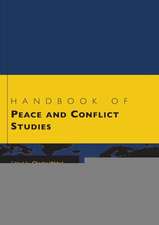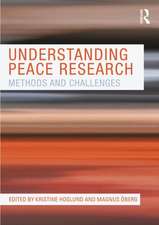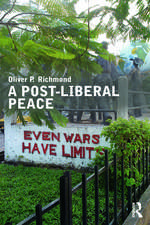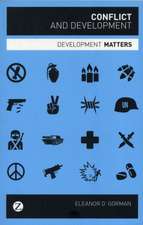Resolving Structural Conflicts: How Violent Systems Can Be Transformed: Routledge Studies in Peace and Conflict Resolution
Autor Richard E. Rubensteinen Limba Engleză Hardback – 16 ian 2017
Resolving Structural Conflicts addresses a key issue in the field of conflict studies: what to do about violent conflicts that are not the results of misunderstanding, prejudice, or malice, but the products of a social system that generates violent conflict as part of its normal operations. This question poses enormous challenges to those interested in conflict resolution, since the solution to this problem involves restructuring social, political, and cultural systems rather than just calling in a mediator to help people arrive at an agreement. This study breaks new ground in showing how local conflicts involving crime, police, and prisons; transnational conflicts involving religious terrorism by groups like ISIS; and international conflicts involving Great Power clashes are all produced in large part by elite-driven, exploitative or oppressive social structures. It also presents new ideas about the implications of this ‘structural turn’ for the practice of conflict resolution, emphasizing the need for conflict resolvers to embrace a new politics and to broaden their methods far beyond traditional forms of facilitation.
Written by a leading scholar, this book will be of much interest to students of conflict resolution, peace studies, war and conflict studies, sociology, political science and international relations in general.
| Toate formatele și edițiile | Preț | Express |
|---|---|---|
| Paperback (1) | 381.00 lei 6-8 săpt. | |
| Taylor & Francis – 10 ian 2017 | 381.00 lei 6-8 săpt. | |
| Hardback (1) | 818.67 lei 6-8 săpt. | |
| Taylor & Francis – 16 ian 2017 | 818.67 lei 6-8 săpt. |
Din seria Routledge Studies in Peace and Conflict Resolution
-
 Preț: 314.01 lei
Preț: 314.01 lei -
 Preț: 296.65 lei
Preț: 296.65 lei -
 Preț: 137.59 lei
Preț: 137.59 lei -
 Preț: 301.63 lei
Preț: 301.63 lei -
 Preț: 324.91 lei
Preț: 324.91 lei -
 Preț: 231.06 lei
Preț: 231.06 lei -
 Preț: 466.45 lei
Preț: 466.45 lei - 25%
 Preț: 323.04 lei
Preț: 323.04 lei - 18%
 Preț: 1053.92 lei
Preț: 1053.92 lei -
 Preț: 385.54 lei
Preț: 385.54 lei - 18%
 Preț: 1117.43 lei
Preț: 1117.43 lei - 28%
 Preț: 821.82 lei
Preț: 821.82 lei - 18%
 Preț: 1165.73 lei
Preț: 1165.73 lei - 16%
 Preț: 337.39 lei
Preț: 337.39 lei - 18%
 Preț: 1168.37 lei
Preț: 1168.37 lei - 18%
 Preț: 1114.08 lei
Preț: 1114.08 lei - 18%
 Preț: 705.53 lei
Preț: 705.53 lei - 28%
 Preț: 822.34 lei
Preț: 822.34 lei - 18%
 Preț: 1049.36 lei
Preț: 1049.36 lei - 18%
 Preț: 1054.71 lei
Preț: 1054.71 lei - 18%
 Preț: 999.98 lei
Preț: 999.98 lei -
 Preț: 390.37 lei
Preț: 390.37 lei - 25%
 Preț: 853.43 lei
Preț: 853.43 lei - 30%
 Preț: 847.86 lei
Preț: 847.86 lei -
 Preț: 411.42 lei
Preț: 411.42 lei -
 Preț: 412.37 lei
Preț: 412.37 lei - 49%
 Preț: 543.52 lei
Preț: 543.52 lei - 17%
 Preț: 296.21 lei
Preț: 296.21 lei - 16%
 Preț: 299.52 lei
Preț: 299.52 lei - 28%
 Preț: 824.70 lei
Preț: 824.70 lei -
 Preț: 485.84 lei
Preț: 485.84 lei - 13%
 Preț: 295.49 lei
Preț: 295.49 lei - 18%
 Preț: 1166.80 lei
Preț: 1166.80 lei -
 Preț: 406.05 lei
Preț: 406.05 lei - 18%
 Preț: 1111.51 lei
Preț: 1111.51 lei - 18%
 Preț: 1164.44 lei
Preț: 1164.44 lei - 18%
 Preț: 1060.87 lei
Preț: 1060.87 lei -
 Preț: 381.00 lei
Preț: 381.00 lei - 28%
 Preț: 822.01 lei
Preț: 822.01 lei - 28%
 Preț: 848.22 lei
Preț: 848.22 lei
Preț: 818.67 lei
Preț vechi: 1102.07 lei
-26% Nou
Puncte Express: 1228
Preț estimativ în valută:
156.65€ • 170.70$ • 132.00£
156.65€ • 170.70$ • 132.00£
Carte tipărită la comandă
Livrare economică 23 aprilie-07 mai
Preluare comenzi: 021 569.72.76
Specificații
ISBN-13: 9781138956322
ISBN-10: 1138956325
Pagini: 170
Dimensiuni: 156 x 234 mm
Greutate: 0.39 kg
Ediția:1
Editura: Taylor & Francis
Colecția Routledge
Seria Routledge Studies in Peace and Conflict Resolution
Locul publicării:Oxford, United Kingdom
ISBN-10: 1138956325
Pagini: 170
Dimensiuni: 156 x 234 mm
Greutate: 0.39 kg
Ediția:1
Editura: Taylor & Francis
Colecția Routledge
Seria Routledge Studies in Peace and Conflict Resolution
Locul publicării:Oxford, United Kingdom
Public țintă
Postgraduate, Professional, and UndergraduateCuprins
Introduction
1. Partisan moralism and the need for structual thought
2. How do social systems generate violence?
3. Violent systems and their transformation
4. Class conflict and the problem of crime
5. Cultural conflict and the problem of religious violence
6. Structural conflict resolution: Towards a new politics
1. Partisan moralism and the need for structual thought
2. How do social systems generate violence?
3. Violent systems and their transformation
4. Class conflict and the problem of crime
5. Cultural conflict and the problem of religious violence
6. Structural conflict resolution: Towards a new politics
Notă biografică
Richard E. Rubenstein is University Professor of Conflict Resolution and Public Affairs at the School for Conflict Analysis and Resolution, George Mason University, and the author of eight books, including most recently Reasons to Kill: Why Americans Choose War (2010).
Recenzii
'Rubenstein actually does two jobs in Resolving Structural Conflicts. He not only shows how vertical, exploitative class structures, pitting high against low domestically and protecting class all over through global hegemony can be broken down. He also paves the way intellectually for breaking the taboos on class in US thinking about conflict without falling into the many marxist traps. I strongly endorse the book as a major contribution to US conflict studies'. -- Johan Galtung, Founder of Transcend International
'Richard Rubenstein has done it again! In an accessible, wide-ranging, and brilliant set of discussions he places a mirror before all of us engaged in peace and conflict studies and practice. We have for too long relied on simple explanations about change strategies when we face direct and structural violence, a field-wide habit that attends to the first but rarely the second. Rubenstein's comprehensive and constructive engagement suggests our platitudes and frameworks must evolve in ways that more seriously address the challenge of how we pursue systemic and structural change. Filled with practical examples, theoretically sophisticated interaction with key authors in both conflict resolution and the wider social sciences, and ground breaking critique and ideas this book deepens and expands our our scholarship and practice alike. A must read for which we should all be grateful!' -- John Paul Lederach, Kroc Institute, University of Notre Dame, USA
'In this provocative book Richard Rubenstein sets out to answer two basic questions: How does the socioeconomic system generate violence? And, What can conflict specialists do about it? In response, he returns us to two of the formative ideas in peace and conflict studies – unfulfilled human needs and structural violence – and elaborates them through theorizing and practice in the first two "waves" of conflict and conflict resolution, focused on interests and identity. Rubenstein argues for a "third wave," which demands a critical engagement with the socioeconomic system, the structure, within which all the other dynamical, symbolic, and political systems are embedded. This entails "breaking the silence about social class," and about class struggle as the "conflict that dare not speak its name." In returning conflict resolution to structure and class, he argues for recognizing that poverty, inequality, and indelible harm to human dignity, generate and reproduce conflict and violence as normal or naturalized, thus invisible or taken-for-granted. He rejects a vision of conflict resolution as "pallid reform," or an acquiescent "abstentionism" that believes profound structural change is unlikely or impossible. Deeply analytical, infused with passion and powerfully written, I read this book as a provocation, a challenge to conflict studies and conflict resolution practice.' -- Kevin Avruch, George Mason University, USA
'Over the years Richard Rubenstein has demonstrated an unusual talent for tackling the toughest societal challenges, provocatively combining lucid analysis with humane prescriptive wisdom. Rubenstein does it here once more, daring to consider how the social structures associated with neo-imperial capitalism generate acute violent conflict, yet can and should be transformed. A major intellectual contribution, this book should excite progressives and make liberals tremble.' -- Richard Falk, University of California, Santa Barbara, USA
'Richard Rubenstein has done it again! In an accessible, wide-ranging, and brilliant set of discussions he places a mirror before all of us engaged in peace and conflict studies and practice. We have for too long relied on simple explanations about change strategies when we face direct and structural violence, a field-wide habit that attends to the first but rarely the second. Rubenstein's comprehensive and constructive engagement suggests our platitudes and frameworks must evolve in ways that more seriously address the challenge of how we pursue systemic and structural change. Filled with practical examples, theoretically sophisticated interaction with key authors in both conflict resolution and the wider social sciences, and ground breaking critique and ideas this book deepens and expands our our scholarship and practice alike. A must read for which we should all be grateful!' -- John Paul Lederach, Kroc Institute, University of Notre Dame, USA
'In this provocative book Richard Rubenstein sets out to answer two basic questions: How does the socioeconomic system generate violence? And, What can conflict specialists do about it? In response, he returns us to two of the formative ideas in peace and conflict studies – unfulfilled human needs and structural violence – and elaborates them through theorizing and practice in the first two "waves" of conflict and conflict resolution, focused on interests and identity. Rubenstein argues for a "third wave," which demands a critical engagement with the socioeconomic system, the structure, within which all the other dynamical, symbolic, and political systems are embedded. This entails "breaking the silence about social class," and about class struggle as the "conflict that dare not speak its name." In returning conflict resolution to structure and class, he argues for recognizing that poverty, inequality, and indelible harm to human dignity, generate and reproduce conflict and violence as normal or naturalized, thus invisible or taken-for-granted. He rejects a vision of conflict resolution as "pallid reform," or an acquiescent "abstentionism" that believes profound structural change is unlikely or impossible. Deeply analytical, infused with passion and powerfully written, I read this book as a provocation, a challenge to conflict studies and conflict resolution practice.' -- Kevin Avruch, George Mason University, USA
'Over the years Richard Rubenstein has demonstrated an unusual talent for tackling the toughest societal challenges, provocatively combining lucid analysis with humane prescriptive wisdom. Rubenstein does it here once more, daring to consider how the social structures associated with neo-imperial capitalism generate acute violent conflict, yet can and should be transformed. A major intellectual contribution, this book should excite progressives and make liberals tremble.' -- Richard Falk, University of California, Santa Barbara, USA
Descriere
This book analyses structural or system-generated conflicts and poses the fundamental question: 'If there are systems generating this conflict, how can they be changed?' Showing how systems established to maintain a peaceful social order sometimes end by generating serious violence, the author discusses how to envision and implement new methods of transforming violence-prone systems.















